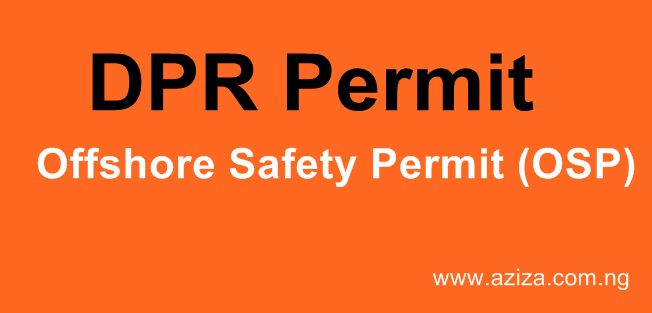ABOUT OFFSHORE SAFETY PERMIT (OSP)
Offshore Safety Permit (OSP) is a Personnel Accountability System (PAS) designed by the Department of Petroleum Resources in Nigeria for the tracking of personnel working in Onshore and Offshore locations, managing installations owned and/or operated by Oil and Gas operators and contractors in Nigeria.
The fundamental purpose of OSP is to account for and save the lives of the oil and gas workers through effective training in compliance with Minerals Oils (Safety) Regulations and International Codes, Standards and Best Practices. OSP is a necessary safety precursor for every person operating in onshore and offshore locations in Nigeria as it helps to achieve the following:
- Ensure the right skills/competency mix of employees is deployed.
- Ensure that basic safety/survival training is obtained prior to deployment.
- Enhance the dossier of oil and gas personnel details for the provision of Emergency Response functionality.
- Provides real-time information on personnel movement to and from worksites.
- Ensure that personnel at worksites have the required medicals.
- Create a platform for managing immigration activities.
- Effective decision/policy making tool for the Nigerian oil and gas Industry.
It also enables operators to manage personnel in case of mustering requirement during emergencies. The OSP is equally a latent instrument that strengthens the intent of the Nigerian content bill by providing platform for managing activities in the Nigerian Oil and Gas Industry.
There are quite a number of Laws of the federation upon which the OSP is based and one of such is the Petroleum Acts CAP 350 which emphasizes achieving Operational Excellence in Oil and Gas activities in Nigeria. Another provision of the law enabling the implementation of the Mineral Oils (Safety) Regulations, 1997 are sections 5, 6, 8, 9, 18 and 20 which makes it mandatory for workers to be accounted for and to be trained. Also, Section 44 of the Petroleum (Drilling & Production) Regulations 1969 makes it mandatory for operators to comply with any directives for achieving health and safety of workers.
The Department is responsible for the issuance, and establishment/management of OSP in the National Data Repository (NDR), while the carrier provides the required infrastructure for the implementation.
The official fee for the OSP is $680 one off payment for every offshore worker and is renewable on a yearly basis at a fee of $135.
Types of Offshore Safety Permits:
There are Seven (7) types of offshore safety permits in which personnel intending to travel/work offshore may apply under.
They are: –
- Full Offshore Safety Permit (Blues OSP Card) issued to those seeking to make frequent trips to offshore facilities. It requires (T) BOSIET or (T) FOET from a DPR-approved training organization.
- Travel Safely by Boat Offshore Safety Permit (green OSP Card) issued to those who have completed the Travel Safety by Boat (TSbB) training.
- Marine Crew Offshore Safety Permit (Red OSP Card) issued based on the applicants’ STCW training and Certificate of Competence and proof of BOSIET training. They are restricted to travel by boat only and not permitted to travel by helicopter unless they have undergone HUET training.
- Helicopter- only Offshore Safety Permit (Orange OSP Card) issued to those who have undergone HUET training and the applicant shall show proof that his specific role does not require continuous stay at offshore/swamp locations (like Marine Crew members).
- Infrequent Offshore Traveler Safety Permit (White OSP Card) for those work regularly offshore but cannot be used for more than four (4) return trips to offshore/swamp locations within a given year. This is valid for three (3) years with a maximum of four (4) offshore return trips in each year.
- VIP/ One-Time Visit Offshore Safety Permit (Yellow OSP Card)
- Special Offshore Safety Permit (Purple OSP Card): In exceptional circumstances, a Special Offshore Safety Permit may be issued, subject to approval of the Director of Petroleum Resources. This is usually for visit to an offshore facility by State Dignitaries, Senior Company Managers and Directors, Government visitors and other Very Important Persons. The application for Special Offshore Safety Permit to the Director shall indicate at the minimum, the name of personnel, designation/role, brief details of intended activity at the offshore/swamp location, intended travel date and travel destination. The Special Offshore Permit is valid for a maximum of two (2) return trips per year. Subsequent visit will attract the fees applicable to One-Time Visit OSP.
The requirements for Special OSP permits are listed below:
vii. (i) Before the offshore travel, all visitors must be given travel briefing and upon arrival to location, be given site HSE briefing;
vii. (ii) Visitors are to be accompanied always by personnel from the Host Team and ensure the Visitor Helmet policy of licensee or lessee is followed;
vii. (iii) Optimized sitting arrangement (e.g. TBOSIET/TFOET trained passenger to sit next to door/window as well as to be the buddy for non-HUET trained visitor/ passenger).
vii. (iv) The personnel are not permitted to make an overnight stay at offshore/swamp location. Same day return flight must be ensured for all visitors.

